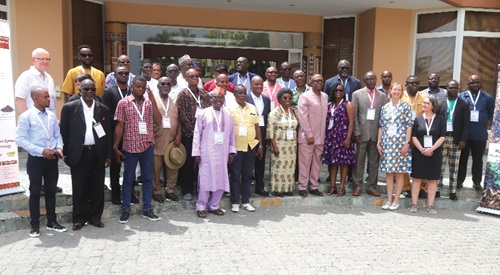A revolutionary technology is being introduced in West Africa by the International Institute of Tropical Agriculture (IITA) to provide an alternative protein source for the poultry industry to help boost the sector.
The technology, known as the Black Soldier Fly (BSF) for Bio Circular Economy and Environmental Sustainability (BBEST) project, uses black soldier flies to process bio-waste and produce a valuable protein source.
The BBEST initiated by IITA, in collaboration with the Norwegian Agency of Development Cooperation (NORAD), aimed at providing alternative protein feed for poultry feed to enhance the poultry industry in countries where they were piloted.
The project, dubbed “Chicken, fish and pig feed and organic fertiliser value chain development using the Black Soldier Flies (BSF)-based organic biowaste processing in DRC, Ghana, Mali and Niger”, was launched three years ago by IITA.
Viability
Speaking during an interview at the annual review and planning forum on the BBEST project organised at the African Regent Hotel in Accra, the BBEST Project Manager, Dr Mawufe Komi Agbodzavu, said the BSF technology was an innovative solution to the scarcity and high cost of protein sources for animal feed formulation.
"The black soldier fly is an insect that develops on organic waste. At the end of the process, you have a valuable protein," Dr Agbodzavu explained.
He indicated that the project sought to demonstrate that using BSF technology was a more viable and profitable business.
Dr Agbodzavu stated that while some countries in East and South Africa have already adopted the technology, West Africa was still in the early stages of implementation.
Production
Touching on the production process, the Project Manager explained that “the production process involves trapping the black soldier flies in areas with organic waste, such as abattoirs or dumpsites.
“The flies are then bred in a controlled environment and their larvae are harvested and processed into a protein-rich feed supplement,” he said.
Dr Agbodzavu emphasised that the technology was safe and did not pose any health risks.
"The black soldier fly does not transmit diseases and it is not a pest that will infest your house," he assured.
Recommendation
Speaking on the life of the BSF, Dr Agbodzavu said it had approximately 35-40 days, depending on the climate and temperature.
He expressed optimism that the BSF technology would become a game-changer for the poultry industry in West Africa.
"We are providing value information to incite private investors to invest in this business technology.
“Very soon, there will be a lot of investment in this sector and the production of the BSF will be done on a huge commercial scale," he said.
Dr Agbodzavu recommended that entrepreneurs interested in starting a BSF business should invest in first obtaining a starter colony from an existing operator or trap their flies in areas with organic waste, as it was foundational and critical for the production of the BSF and its sustainability.

